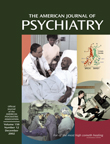Risperidone-Induced Hyperprolactinemia in an Elderly Woman
Ms. A, a 72-year-old schizophrenia patient who was married and had three children, had suffered from schizophrenia from age 32. Poor insight and poor drug compliance made her psychiatric condition unstable. She was admitted for auditory hallucinations and religious, persecutory, and somatic delusions. Treatment trials with many conventional antipsychotics had failed to produce any significant improvement. Risperidone was initially administered, at 4 mg/day; 3 months later, the dose was increased to 5 mg/day because Ms. A had not achieved remission.Two months later, a tender 3×2-cm mass with an erythematous skin change over the left breast was noted, with purulent discharge from the nipple. Two left auxiliary lymph node enlargements (0.9×1.2 cm and 1.5×0.8 cm) were also detected. A medical evaluation revealed an elevated serum prolactin level (104.68 ng/ml). A sonogram-guided biopsy showed edema and diffuse infiltration by leukocytes within lobules, but no abnormal cells were noted. Results of tests for two tumor markers (CEA and CA 153) were both negative. Because of the appearance of mastitis, the oral antibiotic cefadroxil monohydrate was administered, and risperidone was switched to quetiapine, 600 mg/day. Ten days later, the breast mass and lymph node enlargement subsided completely, and Ms. A’s prolactin level fell to 20.55 ng/ml.
References
Information & Authors
Information
Published In
History
Authors
Metrics & Citations
Metrics
Citations
Export Citations
If you have the appropriate software installed, you can download article citation data to the citation manager of your choice. Simply select your manager software from the list below and click Download.
For more information or tips please see 'Downloading to a citation manager' in the Help menu.
View Options
View options
PDF/EPUB
View PDF/EPUBLogin options
Already a subscriber? Access your subscription through your login credentials or your institution for full access to this article.
Personal login Institutional Login Open Athens loginNot a subscriber?
PsychiatryOnline subscription options offer access to the DSM-5-TR® library, books, journals, CME, and patient resources. This all-in-one virtual library provides psychiatrists and mental health professionals with key resources for diagnosis, treatment, research, and professional development.
Need more help? PsychiatryOnline Customer Service may be reached by emailing [email protected] or by calling 800-368-5777 (in the U.S.) or 703-907-7322 (outside the U.S.).

